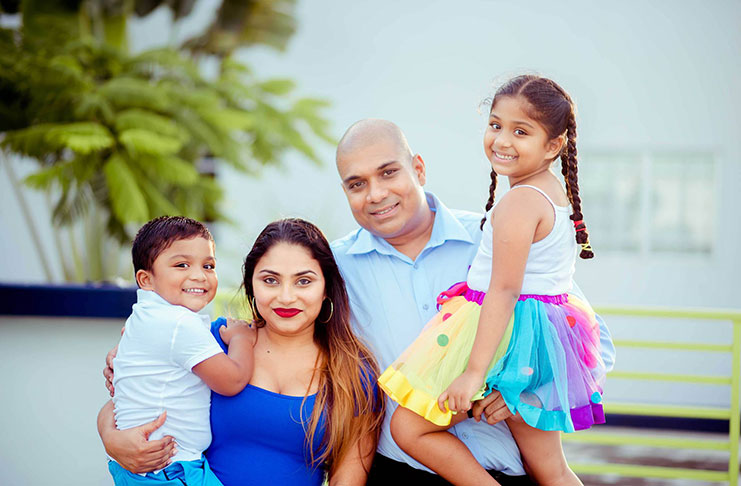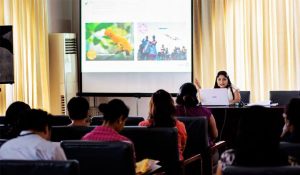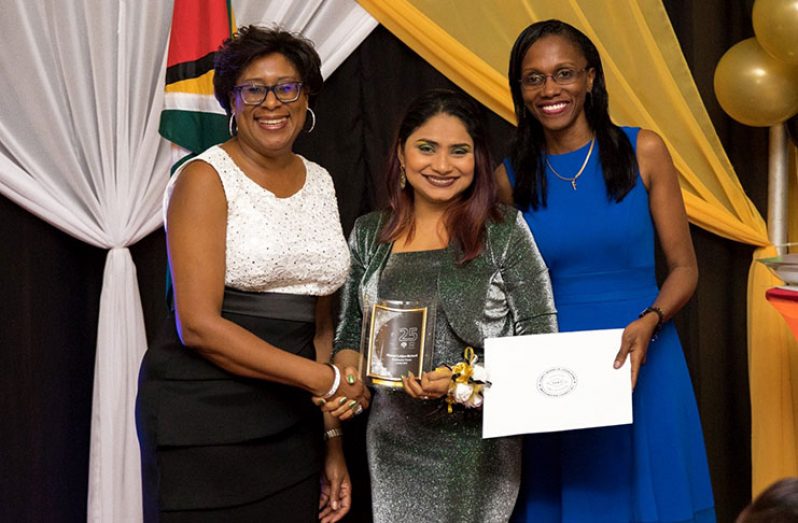– says Heal Guyana Founder
By Telesha Ramnarine
WOMEN in Guyana are doing “exceptionally” well in the education sector so far as remaining in school and moving on to tertiary levels are concerned. In fact, Heal Guyana Founder Sharon Lalljee-Richard believes that the female number of enrollment at the university level has been double that of the male numbers.
Lalljee-Richard, a dedicated and hardworking mother of two young children, remains passionate about doing her bit to help solve some of the ills in society, and as such, devotes a lot of her time toward promoting her Heal Guyana organisation.
Heal Guyana is a civil society platform that seeks to empower Guyanese and influence positive behaviour change, further seeking to embrace “free-thinking” above political loyalty and bias.

Keen on engaging in lots of research and fact-checking, a rather principled Lalljee-Richard is a stickler for accuracy, and likes to cross all her t’s and dot all her I’s. Her organisation is not political and features the perspectives of those who are “free-thinkers,” and who aims to put the welfare of Guyanese before political loyalties and biases.
In an interview with the Pepperpot, as she reflected on International Women’s Day 2020, Lalljee-Richard thought about some of the positive developments surrounding women in Guyana and also called to mind some of the hardcore issues affecting them, such as domestic violence, that seems to be going nowhere.
So far as her comments on women in education are concerned, Lalljee-Richard, also Director of Tactical Branding, is of the view that more and more women are taking pride in educating themselves, and are demonstrating a commitment to completing their education.
“I think women are doing exceptionally well in the area of education in Guyana. There is a huge gender disparity in terms of the level of girls staying in school. What we found is that the tendency for girls to stay in school has been higher,” she expressed, adding, “At the university level as well, we have had a large enrollment of females. I believe it is probably twice as much as males. There is also a very high graduation rate among women at the tertiary level.”
Compared to the circumstances that existed in the past, Lalljee-Richard is convinced that women are doing significantly better within the aspects of educating themselves and staying committed to that.
Women in the Workplace

Within the work arena, Lalljee-Richard’s research has shown her that although a lot more women are in the workplace as compared to times past, they are not without challenges.
“It’s a scenario where, based on the World Bank’s 2017 Report, women between the ages of 15 and 64; only 53 percent of them contributed to the labour force in comparison to 80 percent of men in the same age range. So it is sort of an interesting anomaly that women have had these lower employment rates.”
Although one may imagine that women’s education should coincide with employment and opportunities, Lalljee-Richard noted that this is not the case in Guyana. “There is that lower percent of women taking part in the labour force and we’ve had scenarios of discriminatory social norms, lower incentives and a total breakdown of legal institutions.”
For example, she observed that some of the social norms are that women should stay at home as opposed to going to work, although this has been rapidly changing. “Women are still showing a tendency of being highly overworked, underpaid, and they also have a higher tendency of being sexually harassed at the workplace.”
‘Dropping the Case’
Lalljee-Richard lauded the work of the Social Protection Ministry so far as helping domestic violence victims is concerned, but she noted that despite all of the efforts, the country has not been doing well in this regard. “We are still dealing with intimate partner violence and we know it has increased by 14.2 percent between 2011 and 2019, which is quite a disappointing figure.”

At the legislative level, Lalljee-Richard opined that there should be improved provisions to prevent women from later going to a police station to drop charges against their partners. She is of the view that once there is substantial evidence that the woman was indeed beaten, the matter should continue against the man whether she wants it to or not. “It needs to become an issue of the state so that it takes the matter forward even if she is desirous of dropping the charge. If that is done, men would think twice before they hit the woman.
“We need a strengthening of institutions. We have very good laws, but I believe with the current legislation, there is that opening where women can go to the police station and drop the charges. This has been a loophole that has been manipulated by men,” she continued.
She is also hopeful that neighbours and family members would look out for each other more so that a strong network can provide help.
“Domestic violence affects the little ones more than anyone else. It is psychologically dangerous for children and also cultivates a cycle of domestic violence,” Lalljee-Richard observed, noting that children should be encouraged to speak out when they see one of their parents is being abused.




.png)









